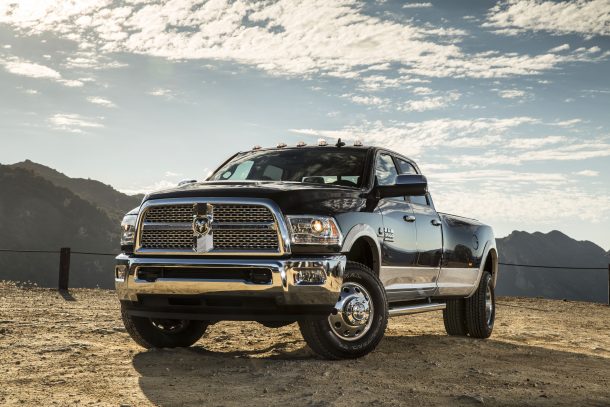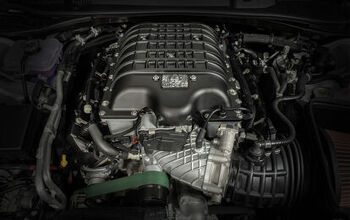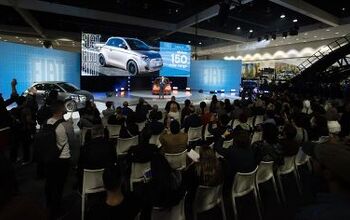Future-proofing: Cummins Wants to Sell You More Than Just Diesels

It’s hard to hear the name Cummins and not immediately think of a Ram pickup struggling valiantly to pull a gnarled tree stump out of the unyielding earth. Certainly, the company’s diesel inline-six and V8 engines are to the truck world what Nike is to professional sports.
While Cummins’ fossil fuel-powered engines and power systems show no signs of becoming passé, a company ignores the future at its own peril. The green revolution is afoot, we’re told, and internal combustion power will one day occupy the niche currently inhabited by electric propulsion. With this in mind, Cummins has a plan.
During a teleconference Thursday, company executives outlined what the near future holds.
“As a global power leader for the commercial and industrial markets we serve, we are better positioned than any other company to win in new and emerging technologies,” said Tom Linebarger, Cummins Chairman and CEO. “Over the past 100 years, our ability to innovate and adapt has fueled our success and we are confident we are on the right path to do it again at this critical juncture. We are prepared to provide a range of power technologies to our customers from diesel and natural gas to fully electric and hybrid powertrains to ensure they always have the best solution for their application.”
That 6.7-liter inline-six turbo diesel in your Ram work truck (or oil-burning 5.0-liter V8 in your Nissan Titan) won’t disappear overnight. The company claims it will continue to focus on diesel engines as a core component of its business model, while pouring more R&D dollars into green tech. Cummins first went down this road with its natural gas-powered engines.
If future truck owners want it, Cummins wants to supply it.
So great is the urge to be out in front, the company is considering teaming up with others. Cummins hopes to develop a range of products — electric energy storage systems, power electronics and traction motor systems — for commercial applications.
“Cummins will begin electrified powertrain delivery in 2019, including battery electric and plug-in hybrids,” the company said in a statement. Calling these “first steps” just the beginning, Cummins claims to be working on gasoline engines which feature diesel-like performance, as well as a number of “exploratory” fuel cell projects.
[Image: Fiat Chrysler Automobiles]

More by Steph Willems
Latest Car Reviews
Read moreLatest Product Reviews
Read moreRecent Comments
- TheEndlessEnigma Of course they should unionize. US based automotive production component production and auto assembly plants with unionized memberships produce the highest quality products in the automotive sector. Just look at the high quality products produced by GM, Ford and Chrysler!
- Redapple2 Got cha. No big.
- Theflyersfan The wheel and tire combo is tragic and the "M Stripe" has to go, but overall, this one is a keeper. Provided the mileage isn't 300,000 and the service records don't read like a horror novel, this could be one of the last (almost) unmodified E34s out there that isn't rotting in a barn. I can see this ad being taken down quickly due to someone taking the chance. Recently had some good finds here. Which means Monday, we'll see a 1999 Honda Civic with falling off body mods from Pep Boys, a rusted fart can, Honda Rot with bad paint, 400,000 miles, and a biohazard interior, all for the unrealistic price of $10,000.
- Theflyersfan Expect a press report about an expansion of VW's Mexican plant any day now. I'm all for worker's rights to get the best (and fair) wages and benefits possible, but didn't VW, and for that matter many of the Asian and European carmaker plants in the south, already have as good of, if not better wages already? This can drive a wedge in those plants and this might be a case of be careful what you wish for.
- Jkross22 When I think about products that I buy that are of the highest quality or are of great value, I have no idea if they are made as a whole or in parts by unionized employees. As a customer, that's really all I care about. When I think about services I receive from unionized and non-unionized employees, it varies from C- to F levels of service. Will unionizing make the cars better or worse?


































Comments
Join the conversation
I find an interesting angle on the pickup market: In the near future along comes a practical EV pickup. It's front wheel drive only. What share of the market would it fail to capture due to that factor? That's to say how many American buyers really need a pickup for it's intended purpose?
Let's fire up the ole Cummins and head to the truck meet! *click* *whirr* Wooohoooo!